Attention: there seems to be a known issue with this USB kit! Learn more about the issue here: Lost connectivity to HP microSD Enterprise USB Kit
If you install ESXi on a microSD card and if you use HP Proliant Servers you may be interested in the “HP Dual 8GB MicroSD Enterprise Midline USB” (HP P/N: 741281-002).
This dual-microSD card module provides data redundancy through a mirrored RAID 1 configuration. You connect the module to the internal USB port and install ESXi as usual!
If one of the SD card fails, the configuration of your ESXi host is still available and functional on the second SD card. In this case just replace the module with a new one, install the surviving SD card and configure it as primary.
The module has three status-LEDs:
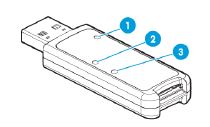
- LED 1 – Power LED
Green: device is on and at least one microSD card is functioning
Red: both microSD cards have failed
- LED 2 – SD Card 2
LED on: microSD card has failed
LED off: microSD card is healthy
- LED 3 – SD Card 1
LED on: microSD card has failed
LED off: microSD card is healthy
How to install the module and VMware ESXi?
Installation and configuration of the module is really easy.
Plug in the microSD card module to the internal USB port and power on the server. The microSD card module is automatically configured and ready to use.
When you install VMware ESXi, you can select it as storage device during the install procedure. It shows up as “HP USB RAID LUN”:
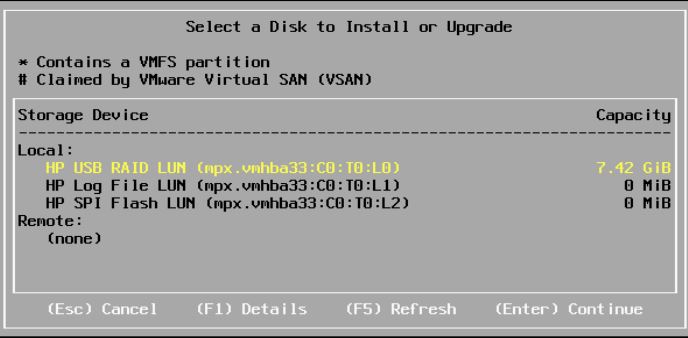
How to replace a failed microSD card?
If a microSD card fails you have to order a new module and carry out the following steps:
- power down the server
- remove the microSD card module
- remove the working microSD card (status LEDs) = your new primary SD card
- remove one of the SD cards in the new module and replace it with your primary one. Please remember the slot number!
- install the module to the internal USB port
- power on the server (you will see an error message 325: microSD cards have conflicting metadata. Configuration required)
- press F9 to enter “System Configuration”
- select “System Health” – “System BIOS”
- highlight “Configuration required” and press Enter
- in the “HP dual MicroSD” configuration menu select the “Primary SD Card Selection”
- now select SD1 or SD2 as primary, depending on which slot contains the primary card from your old device
- press F10 to save changes, exit the menu
- reboot the server
- the device will be reconfigured and your original boot option will appear
- select the primary SD card
- Done!

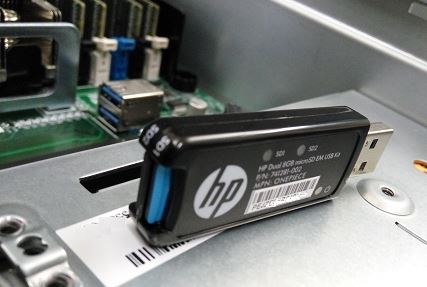
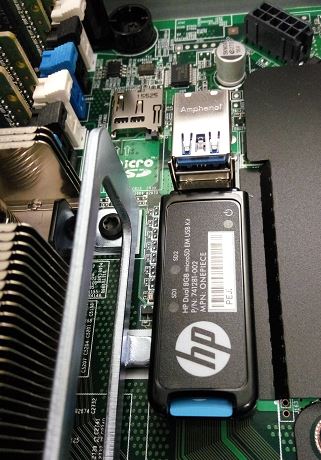
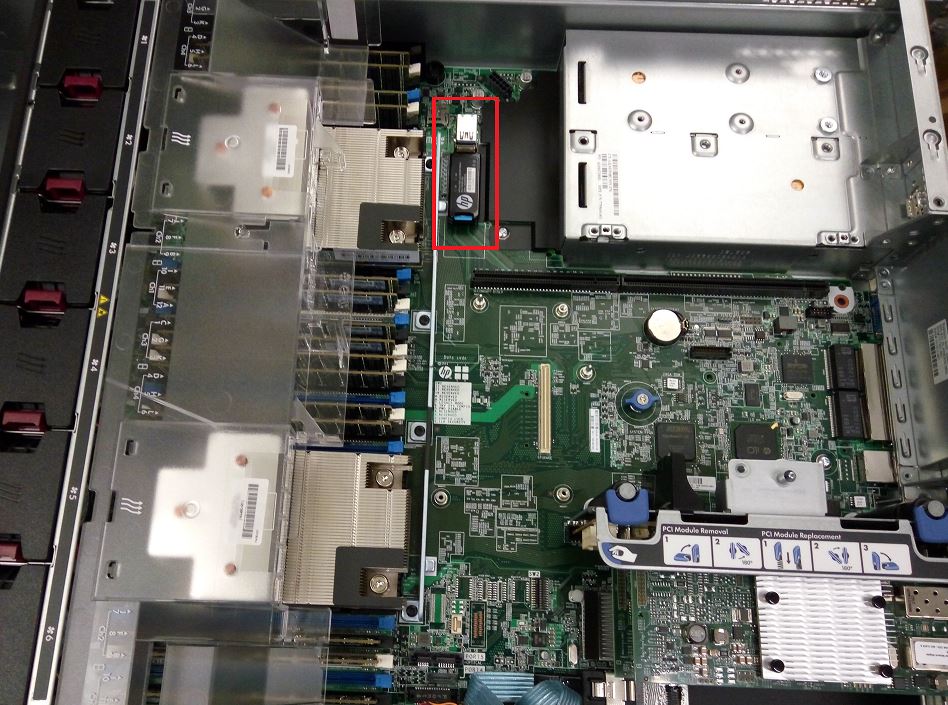
Have you seen an almost 220 ms peak latency reported on the host performance overview when using the dual MicroSD? When you drill in you find it to be read latency to the HP Log File LUN (mpx.vmhba33:C0:T0:L1). I do not know why VMware would be reading this volume. What worries me mostly is this reading would make it difficult to see latency problems on other disks. I’m using ESXi 6 update 2 from the HPE April 2016 ISO.
Thank You.
We had a failure on MicroSD card slot 2. (This was a POST error as the LED light on the USB module was off suggesting the card was healthy)
Getting a replacement USB module with two new MicroSD cards, I replaced the working MicroSD card in to new USB but powering up the server gave a black screen with red text all over (with register data listed). This was before the F9 System option was accessed.
We had to replace all the MicroSD cards with the blank ones and rebuild ESXi as described earlier in the document.
Thanks for the great article.
I have been using this HP enterprise USB device for a while in several servers and the failure rate is far bigger than single SD cards. This is the example of a good idea converted in a nightmare.
This just doesn’t work. I have lots of issues with the sd device… 🙁
Hey Andreas, I have to agree with David. Those USB dongles are really crappy, worst investment (180$) and idea ever. Not realiable at all 🙁
I would suggest using SD cards (30$?), as they are much more cheaper and easier to replace (still have not seen an SD card failing…)
Truly modest SD CARDS duplication administration does not as a matter of course mean low quality administration and there are a few purposes for such shoddy administrations. These organizations utilize modest techniques for SD CARDS duplication and consequently can offer their administrations at such low rates. CD Replication Scotland is a decent case for this.
I too have a lot of issues with these usb dongles on BL460c gen9.
From time to time the ESXi host “loose” the dongle. Powering the server off and on usually works.
Now I have a issue with a server that can’t boot, getting following error:
“324-HP Dual microSD Device Error – Both microSD cards have failed. Action: Replace the HP Dual microSD device.”
Seriously thinking of ripping all USB dongles out of the servers and use the internal sd-card reader… Case with HP have not given anything, they usually seem unaware about this dongle.
same issue here as Bjorn. Had HP troubleshoot the issues. Upgraded all sorts of firmware etc. 10 months later they ended up shipping regular USB sticks as a replacement. No compensation for the time and money spent on these pieces of junk.
Thanks HPE!
After applying Service Pack SPP2016.10 for ProLiant, the issues with the SD’s seems to be significant better. Since the upgrade they run stable.
Unfortunately I was not able to find any record in the release notes. So maybe it is luck – or they changed something and it is not part of the whitepaper 🙂
Sounds good, I have planned to install that one asap.
However, I pretty fed up with this issue. Every time it occurs, I pull the usb dongle and just put the microSD card in the built-in slot reader instead.
Read in some other thread that a others have migrated from HP Dual microSD USB kit to on-board reader with a huge amount of hosts and never had a single SD card failed. Going with that too.
Hallo liebe Produkt-Entwickler von HP, das Teil ist wirklich das Letzte! Nicht zu empfehlen um einen ESXi Host davon zu booten.
Wir haben massive Probleme mit dem Host bekommen, als dieser mal wieder das Bootdevice verlor.
Der VMware Techniker erklärte mir, dass es ein grosses Problem sei mehr als ein USB Device dem ESXi-Server zu präsentieren. Scheinbar hat HP davon noch nichts mitbekommen, denn mit diesem USB-Stick werden gleich 3 LUNs präsentiert.
hostd.log
2017-01-23T16:02:22.563Z info hostd[472C1B70] [Originator@6876 sub=Vimsvc.ha-eventmgr] Event 2646326 : Issue detected on hps31966.local.de in ha-datacenter: Bootbank cannot be found at path ‘/bootbank’
—
# esxcfg-mpath -b
mpx.vmhba32:C0:T0:L0 : Local USB Direct-Access (mpx.vmhba32:C0:T0:L0)
vmhba32:C0:T0:L0 LUN:0 state:active Local HBA vmhba32 channel 0 target 0
mpx.vmhba32:C0:T0:L1 : Local USB Direct-Access (mpx.vmhba32:C0:T0:L1)
vmhba32:C0:T0:L1 LUN:1 state:active Local HBA vmhba32 channel 0 target 0
mpx.vmhba32:C0:T0:L2 : Local USB Direct-Access (mpx.vmhba32:C0:T0:L2)
vmhba32:C0:T0:L2 LUN:2 state:active Local HBA vmhba32 channel 0 target 0
=> multiple connected usb devices
=> this is a problem, as esxi may view one of the others as a boot device
Pingback: Lost connectivity to HP microSD Enterprise USB Kit
is the RAID1 hardware-based or software-based??
That is, is the RAID1 configured in the USB dongle or is it programmed into the microSD cards??
Thank you, Tom